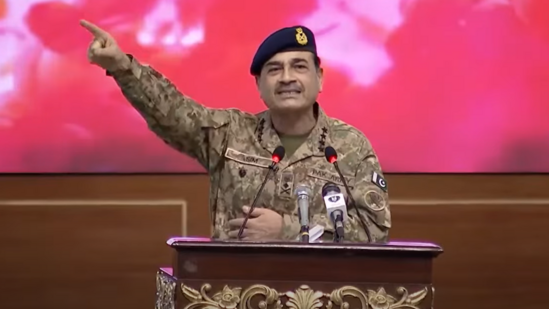Military posture, though important, is not sufficient. It’s important to reach out to Pakistani people exposing its Army’s games and conveying that Indian military preparations are not against their country but against the terrorist groups that their army is propping up. Aggressive messaging will go a long way to calm down Pakistanis of Indian intentions.
By Ankineedu Prasad Nallapati*
India is again caught napping as the Pakistan Army and its proxy terrorist group, Lashkar-e-Taiba, launched a tragic attack, killing 28 innocent tourists at the ski-resort of Pahalgam in Jammu and Kashmir yesterday.
There have been hints of something of the sort coming up, but really carrying out an attack of the scale is a bit adventurous for Pakistan’s Chief of Army Staff, Gen. Asim Munir, who has been besieged by multiple domestic uprisings.
Terror Signals Loud And Clear
In an emotional outburst, while addressing a convention of Overseas Pakistanis on April 16, he replayed the Army’s familiar playbook, “Kashmir is our jugular vein and we continue to do everything in support of people against Indian occupation.”
“We are different from Hindus, our religion is different, our ambitions are different, that’s where the foundation of the two-nation theory was laid. We are two nations, we are not one nation,” he ranted.
He went on to say, “please don’t forget the story of Pakistan, and don’t forget to narrate this story of Pakistan to your next generation, so that their bond with Pakistan never weakens, weather it is the third generation, or the fourth generation, or the fifth generation, they know what Pakistan is for them.”
Ayyesha Siddiqa, Pakistani expert on military affairs and terrorism, warned in February itself that militancy could start again after the winter.
“The establishment that had shied away from demonstrating support for militants publicly, especially under the watch of the Financial Action Task Force (FATF), seems eager to take off the shroud and send a signal across the border that militancy could start again.”
Quoting a knowledgeable source in Islamabad, she said “Rawalpindi is getting ready to restart militancy—at a comparatively lower but noticeable scale—after winters to force India to negotiate on Balochistan. This is Pakistan’s Army chief Asim Munir reversing General (retd) Qamar Javed Bajwa’s policy of appeasement with India.”
The Pakistan Army has shifted this year’s Kashmir Day main event on February 5 to Rawalakot in Pakistan-Occupied Kashmir, which is generally held in Islamabad, to reactivate terrorist groups, which have been dormant for past few years in view of heightened global scrutiny and general apathy in Jammu and Kashmir.
The fact that some members of the Hamas terrorist group were also brought in showed the desperation of the Army to link up the Kashmir issue with Palestinian problem to create new enthusiasm among foot soldiers of the local terrorist groups.
There have also been instances of intrusions since the beginning of this month across the Line of Control in Poonch and other sectors by regular soldiers of the Pakistani Army, which is a clear attempt of diverting attention of the Indian Army, to launch terrorist elements across the border.
What Prompted Gen Munir To Reignite Kashmir
The Army, especially its chief Gen. Munir, is facing unprecedented ignominy not just inside the country but also among Overseas Pakistanis in the US and the UK following dismissal of the previous regime led by Imran Khan three years ago and mishandling of consequent unrest.
The armed forces have also been at the receiving end as the militancy emanating from Afghanistan started haunting them. The Tehrik-e-Taliban Pakistan (TTP), which had been hounded out of their tribal lands of Waziristan in military operations, are venting their vengeance against soldiers as well as Chinese workers.
Baluch uprising, which is as old as the country itself, has found a new voice of youth, particularly women, who are now leading the movement. Militant groups, like the Baluch Liberation Front, have found a new refuge in Afghanistan for their `hit and run’ attacks on military targets.
Pashtuns in Khyber Pakhtunkhwa are up in arms against a new mining bill which they call a renewed colonial onslaught on Pashtun land, resources and sovereignty. The region is mineral-rich, containing some precious stones and metals and the bill is aimed at giving control to federal government to develop them with help of foreign companies.
The latest uprising against the Army and Punjab government is relating to building water canals from Indus River to supply water to new fields in Cholistan area.
In a new twist, the Pakistan Army has allotted itself some 4.8 million acres of state land for lease for a military-operated `corporate farming’. Majority of it is in Punjab, including Cholistan desert. Hence, the water canals. Farmers in Sind launched protests against diversion of their share of water.
No Love Last For General Among Diaspora
Campaign for #FreeImranKhan has picked up momentum among the diaspora community, who are actively lobbying with their host-governments to pressure the Pakistani establishment for restoration of democracy.
A bipartisan `Pakistan Democracy Bill’ was introduced in the US House of Representatives on March 24 by Congressman Joe Wilson, and co-sponsored by Jimmy Panetta. Prominent Pakistani groups in the US have sought help of other influential lobbies to help pass the bill.
It calls for promotion of democracy, human rights, and the rule of law in Pakistan, citing concerns over the country’s February 2024 elections and the military’s influence over civilian governance. It proposes targeted sanctions against Pakistani officials, including the army chief, accused of undermining democracy and persecuting political opponents.
Widespread protests greeted Gen Munir during his official visits to the UK, the last being in February, “condemning military’s escalating oppression against civilians.” Some community leaders have also filed a case against the General to privately prosecute him for torture and other human rights violations.
Need For Boosting Image As Strong Man
Found in such a precarious situation, the Army’s known strategy is to rake up India bashing and launch terrorist attacks that would attract some retribution thus unifying the country again behind the military establishment.
Though global winds are not so favourable for such ventures, Gen. Munir has no time to loose as the noose is tightening around his neck.
Congressional visits have been arranged in quick succession where in the General pitched in with generous offers of metal and mineral mine concessions to curry favour with US President Trump, who has shown special liking for them elsewhere.
Gen. Munir paid a visit to London in February, the third since he became chief in December 2022, where he pleaded with his British counterparts to recommend to the US for a peacekeeping role in Ukraine as a peace agreement was in the offing.
What Options India Has
Despite all the efforts, the Pakistan Army is quite vulnerable. The country’s economic situation is precarious. It cannot preach one thing to Afghanistan and do differently in Kashmir. Militancy from Afghanistan is not going to go away and may only intensify further. International opinion is not quite kind.
It’s time to strike while iron is still hot.
Mobilize armed forces for maximum readiness though immediate military actions may limit to selective terrorist targets.
Military posture, though important, is not sufficient. It’s important to reach out to Pakistani people exposing its Army’s games and conveying that Indian military preparations are not against their country but against the terrorist groups that their army is propping up. Aggressive messaging will go a long way to calm down Pakistanis of Indian intentions.
A long term strategy to be adopted to weaken the hold of the Army and its ever-obeying political elite and encourage democracy to take root. There are several sane voices in Pakistan that see a win-win for our two countries to cooperate and flourish together.
A concerted effort to be made at international level to discourage foreign leaders meeting the Army chief during their visits to the country and confine their meetings to democratically elected leaders. This must start with the US. The UK is a terrible example which sees the Pakistani army and its chief as their soft power and will not like to loosen their grip. India needs to do some tough talking to them.
Our subcontinental neighbours shall be taken into confidence and convey in strongest terms that their engagements with Pakistani army will be taken as “unfriendly” act.
Such a concerted and long term strategy alone will keep all of us in the subcontinent safe and flourishing.
(*Ankineedu Prasad Nallapati is President of the Hyderabad-based think-tank, “Deccan Council for Strategic Initiatives,” and former Additional Secretary to Govt of India)




